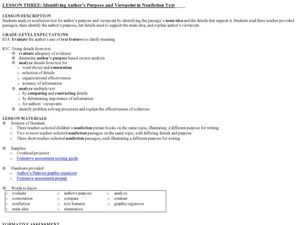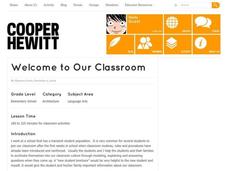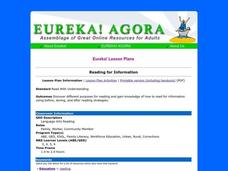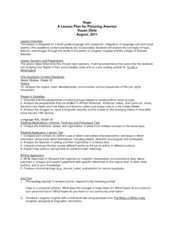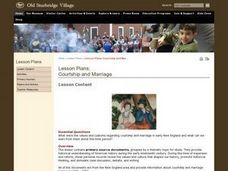College Board
2011 AP® English Literature and Composition Free-Response Questions Form B
It's all in the technique. Authors use many techniques to express themselves using writing. Two of the three essay questions require scholars to analyze the literary devices used by the authors and write essays about how these...
National Endowment for the Humanities
The Declaration of Independence in Six Parts
Everyone knows that the Declaration of Independence is important, but what does it actually say? Members of American history classes analyze the Founding Fathers' arguments against British tyranny and for a more perfect union with a...
DocsTeach
School Desegregation Court Cases: Mendez v. Westminster and Brown v. Board
Separate is not equal! Young historians analyze the petition from the U.S. Supreme Court case Mendez v. Westminster filed in 1945 and examine background material about the case. They then compare it to the more famous Brown v. Board of...
Curated OER
Analyzing Logos
Students analyze common logos they see daily and describe what the logos bring to mind. They redesign a company logo incorporating the company's philosophy into their sketches. Students present their findings and redesign to the class.
Curated OER
Diving into Iceland's Genetic Pool
Investigate ethical issues surrounding the Decode project in Iceland. Middle and high schoolers take the positions of the Icelandic government, scientific researchers, and citizens and defend or refute the Decode project in a Reykjavik...
Curated OER
Gaining Perspective
Discuss race in the United States. Start by having each learner read a copy of Martin Luther King Jr's famous speech, "I Have a Dream." Then, have them read the article "Shared Prayers, Mixed Blessings" about a church in Atlanta,...
Curated OER
Summarizing Key Information
Imagine the surprise when small groups present their Evidence Charts to the class and discover that each group has studied a different version of the Cinderella story. Irish, Ojibwa, Egyptian, Chinese, Korean, Persian, Mexican, and...
Curated OER
Identifying Author’s Purpose and Viewpoint in Nonfiction Text
Why do people write books? Pupils discover how to identify the author's viewpoint. They read non-fiction passages their instructor selects (the plan has the class look at nonfiction children's picture books), and then identify the...
Curated OER
Welcome to Our Classroom
Students create a brochure for new students. In this writing process lesson, students brainstorm, create and edit ideas for making a brochure for new students. Students use a word processor to make the brochure and edit, copy,...
Curated OER
Narrative vs. Expository Texts
Young scholars use examples of narrative and expository text to analyze and compare the two styles. Students read articles on life in Lesotho and Madagascar and use graphic organizers and discussion to compare them. Young scholars write...
Curated OER
Introducing the Memo
Students explore memos to gather important information. In this memos lesson, students interpret memos and answer questions based on the information. Students define the parts of a memo. ...
Curated OER
Rhetorical Devices
Twelfth graders identify and analyze examples of rhetorical devices as valid or invalid inferences. In this text analysis lesson, 12th graders research a controversial topic in teams and identify rhetorical devices for the topic....
Curated OER
Reading for Information
Students explore different strategies for reading with a purpose utilizing information before, during and after reading selections. They find out about a topic of interest and then find a text that contains that interest and analyze that...
Curated OER
Explicit Information in Fiction
Second graders analyze the use of explicit information in fictional texts. In this language arts lesson, 2nd graders read a story and use the text to answer questions.
Curated OER
Picturing America: Images and Words of Hope from Romare Bearden and Langston Hughes
A carefully crafted three-day lesson integrates poetry and visual art. By analyzing and comparing Langston Hughes' poem "Mother and Son" and Romare Bearden's collage "The Dove," readers explore the theme of hope. The lesson activates...
Curated OER
Courtship and Marriage
Students research the concept of courtship and marriage as it pertains to early New England and explore the values and culture that shaped our history. In this courtship and marriage lesson, students examine primary source documents that...
Curated OER
Popular Music and Music Videos
This resource is part of a three-activity unit that introduces your class to the concept of popular culture and the role that it plays in their lives. Here, learners examine the importance of the music industry and music videos in pop...
Dr. Seuss Enterprises
Dr. Seuss in the Classroom
Explore the works of Dr. Seuss, such as Horton Hears a Who, Horton Hatches and Egg, The Sneetches and Other Stories, The Lorax, The Butter Battle Book, and Yertle the Turtle and Other Stories. Each story lesson includes reading...
Santa Ana Unified School District
Getting to the Core: Early American Poets
How do poets convey emotion and represent their views of life? Pupils learn more about Whitman and Dickinson through the unit and analyze their bold reinvention of craft and style for poets to come. Looking at classic pieces such as...
Friends of Fort McHenry
Citizens For and Against the War of 1812
Use this exceptional resource to examine the discourse and debate that occurred at the start of the War of 1812 with your class. Learners will first consider their own position on the war in a silent journal writing activity. Then after...
Curated OER
Making Predictions by Analyzing Key Ideas and Details
Learners make predictions. In this language arts lesson, students read nonfiction texts and make predictions about what they are going to read. Learners confirm and revise their predictions as they read the text.
Pennsylvania Department of Education
Analyzing Key Ideas and Details in Nonfiction
Students explore nonfiction texts. In this language arts lesson, students read a nonfiction text and make predictions. Students identify facts and opinions in the text and draw conclusions as they read.
DePaul University
Settlement
Early settlers in the American Midwest experienced constant struggle. This reading passage describes for young learners the hardships of homesteaders as they journeyed west and sought to start a new life. When finished, students identify...
Curated OER
Analyzing Textbook Formats
Students explore the characteristics of a non-fiction text. In this comprehension lesson, students are led on a guided tour of each text and identify the features of a non-fiction text. Students continue to practice locating features...









